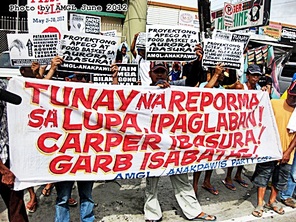
Genuine Agrarian Reform Bill (GARB). Photo by AMGL
Farmers led by Alyansa ng mga Magbubukid sa Gitnang Luson (Amgl, Farmers' Alliance in Central Luzon) and Anakpawis Partylist - Central Luzon call the enactment of House Bill 374 or the Genuine Agrarian Reform Bill (GARB), filed by Anakpawis Partylist Rep. Rafael "Ka Paeng" Mariano and other progressive partylist representatives from Bayan Muna, Gabriela Women's Party, ACT Partylist and Kabataan Partylist. The bill proposes "free land distribution" and "nationalization" of agricultural lands in the country, contrary to the present land reform law, Republic Act 9077, Comprehensive Agrarian Reform Program Extension with "Reforms" (CARPer), that obliges farmers amortization. About 200 farmers from different provinces attended the congressional committee hearing held in Cabiao town, Nueva Ecija.
"GARB is the real land reform bill, as it encoins the centuries-old interest of poor farmers to freely acquire land. CARPer is simply a land brokering deal, where the prices are dictated by the landowners and farmers are not able to cope up with paying amortization," Joseph Canlas said, Amgl chairperson and Anakpawis Partylist - Central Luzon regional coordinator.
Amgl said that farmers in the region are usual victims of cancellation of certificate of land ownership awards (CLOAs), certificate of land transfer (CLT) and emancipation patents (EPs). Owners of CARP-covered lands are now filing various petitions at the Dept. of Agrarian Reform (DAR) simply to re-acquire lands and eject farmer-beneficiaries. In addition, absentee landlords are returning to claim lands dislocating farmers who cultivated for many decades. The group said that this trend is triggered by the continuing land use conversion (LUC) projects in the region such as the construction of highways that add to the value of land, attracting speculators and developers.
"GARB guarantees farmers' hold of the land. Once the land is distributed, landowners are only to transact with the government, particularly about the just compensation and his or her claim of the land is totally cut off," Canlas said.
"CARPer does not embody the significance of agrarian reform and agriculture in our society as it serves the interest of landowners, developers and speculators. It does not protect the farmers' cultivation of the land to sustain agricultural and food production in the country. It is an instrument to eject farmers or preserve landowners' control over the land," Canlas said.
Amgl and its provincial affiliates, Amgl-Nueva Ecija, Aguman Dareng Maglalautang Capampangan (AMC), Alyansa ng Magbubukid sa Tarlak (AMT), Pamana-Aurora, Alyansa ng Magbubukid sa Bulakan (AMB), Amgl-Zambales, Amgl-Bataan and Kilusang Magbubukid ng Pilipinas - Pangasinan (KMP Pangasinan) submitted their position papers supporting the enactment of HB 374 or GARB.
Amgl said that Nueva Ecija farmers are facing foreclosure cases and cancellation of CLOAs, CLTs and EPs. In addition, farmers in Guimba town are being ejected by speculators, using CARP provisions; though the government covered the 3,100-hectares in Fort Magsaysay Military Reservation (FMMR), the Armed Forces of the Philippines (AFP) continues to block the distribution of land to the farmers; the planned Central Luzon Expressway (CLEx) phase 1 and North Luzon East Expressway (NLEx East) are to displace farmers in many towns; and indigenous communities are being displaced in Pantabangan watershed area.
Amgl also cited the case of Hacienda Luisita in Tarlac, where CARP turned farmworker-beneficiaries into "paper" stockholders and kept the control of the Cojuangco-Aquino family over the 6,453-hectare sugarlands. At the interchange of Subic-Clark-Tarlac Expressway (SCTEx) and Tarlac-Pangasinan-La Union Expressway (TPLEx), farmers are being displaced by speculators and developers.
While productive agricultural lands in Bulacan, Pampanga and Bataan are being converted into industrial, commercial and residential estates displacing farmers who developed lands for many decades. In Zambales, farmers and indigenous communities are dislocated by mining operations.
In Aurora province, the Angaras enacted the Aurora Pacific Economic Zone and Freeport Act (Apeco) that covered 13,000 hectares in Casiguran town and displacing many farmers and indigenous communities.
In Pangasinan, the Cojuangco-Aquino family is claiming about 386.8-hectares in Bayambang town, including the former Camp Gregg Military Reservation and covering 12 barangays. Farmers in 2,548-hectare Mangabul lake are being displaced.
"GARB is only the serious bill on land reform and national development. It proposes to liberate farmers from landlessness, poverty and indebtedness to pump up agricultural development. Consequently, it would spark off economic activity and abundant raw materials would supply the light industry and manufacturing," Canlas said.
"CARPer has kept farmers and the agricultural sector restricted, preserved monopoly by landlords and converted our prime agricultural lands. The development to be triggered by GARB would benefit not just the farmers, but also the workers, small businessmen and even local national enterprises, thus, it is only reasonable that different sectors should join the clamor for its enactment and repeal of CARPer," Canlas said. #
 RSS Feed
RSS Feed
